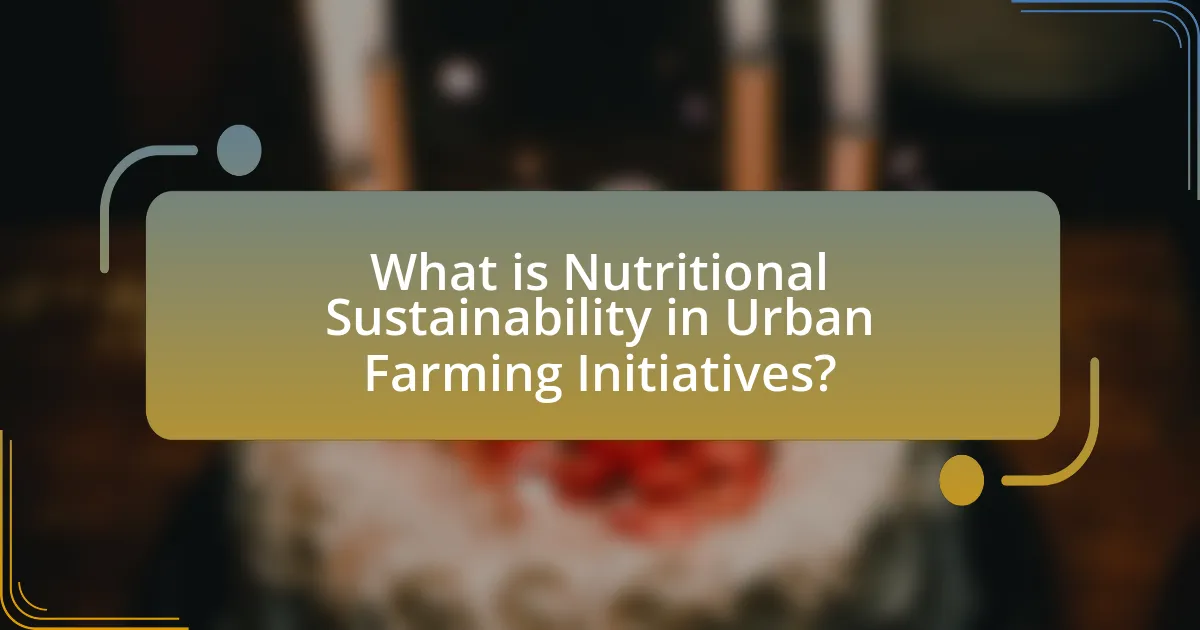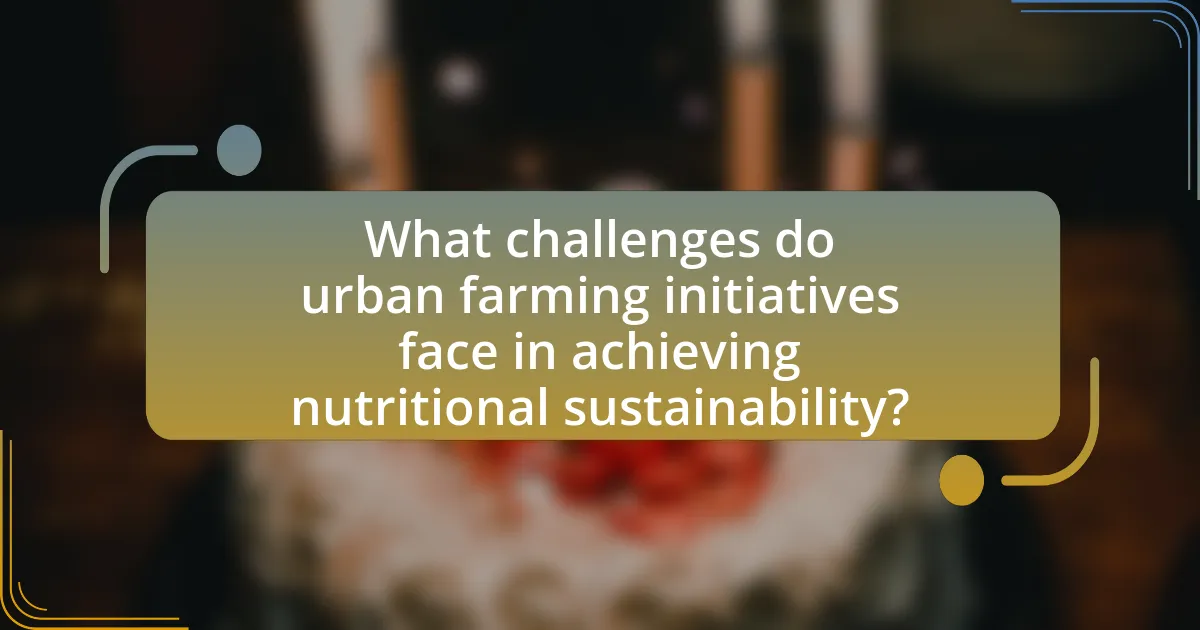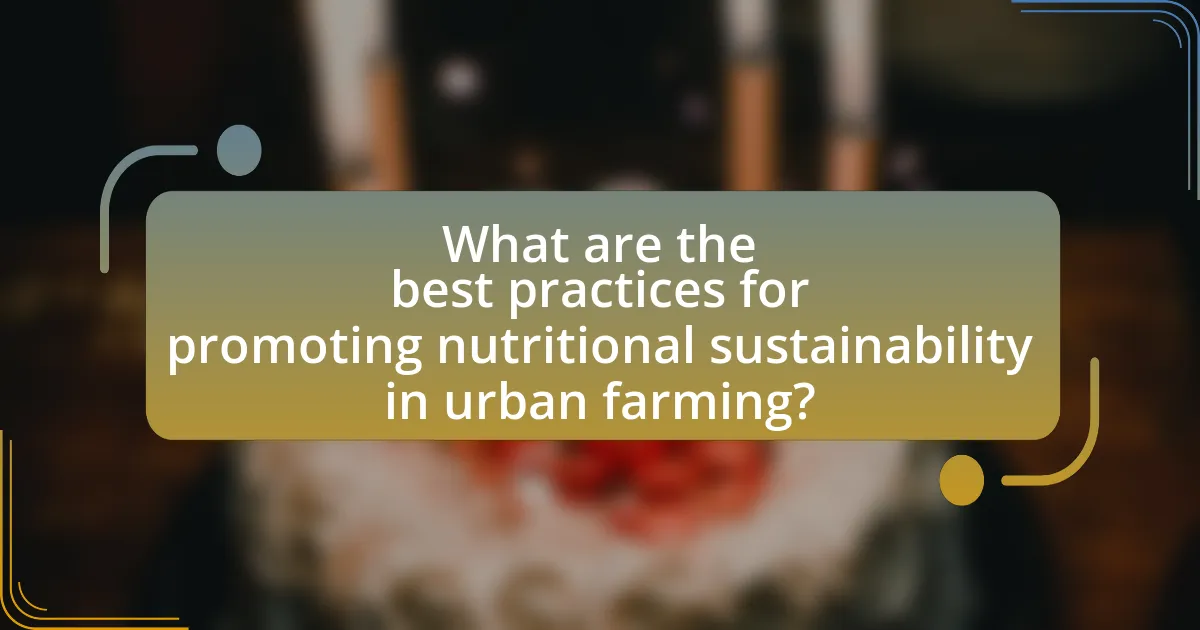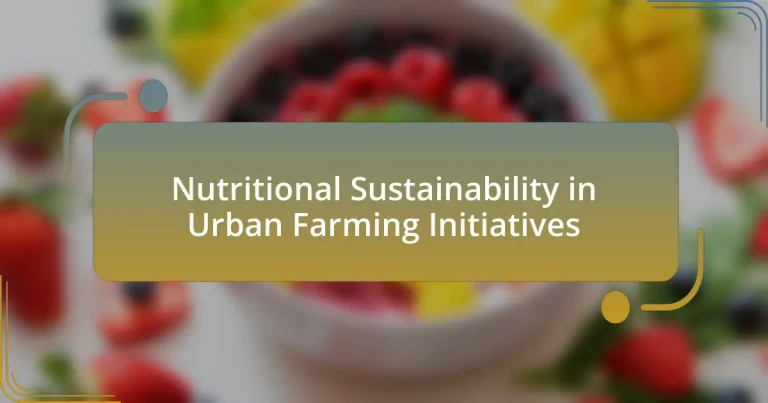Nutritional sustainability in urban farming initiatives is defined as the capacity of urban agriculture systems to consistently provide nutritious food while minimizing environmental impact and promoting social equity. This article explores the principles of nutritional sustainability, including biodiversity, food waste reduction, and equitable access to nutritious food. It examines how urban farming enhances food security, improves health outcomes, and addresses challenges such as resource limitations and regulatory barriers. Additionally, the article highlights innovative practices and community engagement strategies that can enhance nutritional sustainability in urban agriculture, along with the role of local governments and organizations in supporting these initiatives.

What is Nutritional Sustainability in Urban Farming Initiatives?
Nutritional sustainability in urban farming initiatives refers to the ability of urban agriculture systems to provide a consistent supply of nutritious food while minimizing environmental impact and promoting social equity. This concept emphasizes the importance of growing food locally to reduce transportation emissions, enhance food security, and improve access to fresh produce in urban areas. Research indicates that urban farming can significantly contribute to dietary diversity and health outcomes, as seen in studies showing that urban gardens increase the availability of fruits and vegetables in communities, thereby improving nutritional intake.
How is nutritional sustainability defined in the context of urban farming?
Nutritional sustainability in the context of urban farming is defined as the ability to produce food in urban areas that meets the nutritional needs of the population while minimizing environmental impact and ensuring food security. This concept emphasizes the integration of local food systems that prioritize the cultivation of diverse, nutrient-rich crops, thereby enhancing public health and reducing reliance on long-distance food transportation. Research indicates that urban farming can significantly reduce carbon footprints associated with food distribution, as well as promote biodiversity and soil health, which are essential for sustainable food production.
What are the key principles of nutritional sustainability?
The key principles of nutritional sustainability include promoting biodiversity, reducing food waste, and ensuring equitable access to nutritious food. Promoting biodiversity involves cultivating a variety of crops to enhance ecosystem resilience and nutritional diversity. Reducing food waste focuses on minimizing losses throughout the food supply chain, which can significantly lower environmental impact and improve resource efficiency. Ensuring equitable access means addressing social inequalities to provide all communities with the opportunity to obtain healthy food, thereby improving public health outcomes. These principles are supported by research indicating that diverse agricultural systems can lead to better nutrition and environmental sustainability, as highlighted in studies by the Food and Agriculture Organization.
How does urban farming contribute to nutritional sustainability?
Urban farming contributes to nutritional sustainability by increasing local food production, which reduces reliance on long supply chains and enhances food security. By cultivating fruits and vegetables in urban areas, urban farming provides fresh produce that is often more nutrient-dense than items transported over long distances. Studies indicate that urban agriculture can significantly lower food miles, thereby decreasing carbon emissions associated with transportation. Additionally, urban farms often utilize sustainable practices such as composting and organic farming, which further enhance soil health and biodiversity, contributing to a more resilient food system.
Why is nutritional sustainability important for urban communities?
Nutritional sustainability is crucial for urban communities because it ensures access to healthy, locally sourced food while minimizing environmental impact. Urban areas often face food deserts, where residents lack access to fresh produce, leading to poor dietary choices and health issues. By promoting nutritional sustainability through urban farming initiatives, communities can enhance food security, reduce carbon footprints associated with food transportation, and foster local economies. Studies indicate that urban agriculture can increase access to nutritious food by up to 30% in underserved neighborhoods, demonstrating its effectiveness in addressing urban food challenges.
What are the health benefits associated with nutritional sustainability?
Nutritional sustainability offers several health benefits, including improved dietary quality and enhanced food security. By promoting the consumption of locally sourced, seasonal, and diverse foods, nutritional sustainability encourages diets rich in fruits, vegetables, whole grains, and lean proteins, which are linked to lower risks of chronic diseases such as obesity, diabetes, and cardiovascular conditions. Additionally, sustainable practices in urban farming can lead to increased access to fresh produce in underserved communities, thereby reducing food deserts and improving overall public health outcomes. Research indicates that communities engaged in sustainable agricultural practices experience better nutrition and health metrics, as evidenced by studies showing a correlation between local food systems and improved dietary habits.
How does nutritional sustainability impact food security in urban areas?
Nutritional sustainability significantly enhances food security in urban areas by ensuring a consistent supply of healthy, locally produced food. Urban farming initiatives that prioritize sustainable practices, such as organic farming and permaculture, contribute to increased availability of nutritious food options, which directly addresses urban food deserts. According to a study by the Food and Agriculture Organization, urban agriculture can reduce food insecurity by up to 50% in cities with high levels of poverty, as it allows communities to grow their own food, thereby reducing reliance on external food sources that may be less nutritious and more expensive. This localized approach not only improves access to fresh produce but also fosters community resilience and self-sufficiency, further solidifying food security in urban environments.

What challenges do urban farming initiatives face in achieving nutritional sustainability?
Urban farming initiatives face significant challenges in achieving nutritional sustainability, primarily due to limited access to resources, regulatory barriers, and environmental constraints. Limited access to land and water resources restricts the scale and diversity of crops that can be cultivated, impacting overall nutritional output. Regulatory barriers, such as zoning laws and health regulations, can hinder the establishment and operation of urban farms, further limiting their ability to contribute to local food systems. Additionally, environmental constraints, including soil contamination and urban heat islands, can negatively affect crop yields and quality. These factors collectively impede urban farming’s potential to provide a consistent and diverse supply of nutritious food to urban populations.
What are the common barriers to implementing sustainable practices in urban farming?
Common barriers to implementing sustainable practices in urban farming include limited access to resources, regulatory challenges, and lack of community engagement. Limited access to resources, such as funding, land, and technical knowledge, hinders the ability of urban farmers to adopt sustainable methods. Regulatory challenges often arise from zoning laws and land use policies that do not support urban agriculture. Additionally, lack of community engagement can lead to insufficient support and participation, which are crucial for the success of sustainable urban farming initiatives. These barriers collectively impede the advancement of nutritional sustainability in urban farming.
How do economic factors influence urban farming sustainability?
Economic factors significantly influence urban farming sustainability by determining the financial viability and resource allocation for farming initiatives. Access to capital, market demand, and pricing of inputs directly affect the ability of urban farms to operate sustainably. For instance, a study by the American Farmland Trust indicates that urban farms with stable financial backing are more likely to invest in sustainable practices, such as organic farming and water conservation technologies. Additionally, fluctuating market prices for produce can impact profitability, which in turn influences the long-term sustainability of urban farming operations. Therefore, economic stability and market conditions are critical for fostering sustainable urban agriculture.
What role does policy play in supporting or hindering urban farming initiatives?
Policy plays a crucial role in either supporting or hindering urban farming initiatives by establishing regulations, providing funding, and creating frameworks that influence land use and resource allocation. Supportive policies, such as zoning laws that permit agricultural activities in urban areas, can facilitate the establishment of community gardens and urban farms, thereby enhancing local food production and nutritional sustainability. Conversely, restrictive policies, such as those that limit land access or impose high taxes on urban agriculture, can stifle these initiatives, leading to reduced food security and limited access to fresh produce in urban environments. For instance, cities like Detroit have implemented policies that promote urban agriculture, resulting in increased community engagement and improved access to healthy food options, while other cities with stringent regulations have seen minimal urban farming development.
How can urban farmers overcome these challenges?
Urban farmers can overcome challenges by implementing innovative techniques such as vertical farming, hydroponics, and community engagement. These methods maximize space and resources, allowing for efficient food production in limited urban environments. For instance, vertical farming can increase crop yield by up to 10 times per square foot compared to traditional farming, as reported by the National Agricultural Statistics Service. Additionally, engaging local communities fosters support and collaboration, which can lead to shared resources and knowledge, further enhancing sustainability efforts.
What innovative practices can enhance nutritional sustainability in urban farming?
Innovative practices that can enhance nutritional sustainability in urban farming include vertical farming, aquaponics, and community-supported agriculture (CSA). Vertical farming utilizes stacked layers of crops in controlled environments, significantly increasing yield per square foot while reducing water usage by up to 90% compared to traditional farming methods. Aquaponics combines fish farming with plant cultivation, creating a symbiotic environment that minimizes waste and maximizes nutrient cycling, leading to healthier crops. Community-supported agriculture fosters direct relationships between farmers and consumers, promoting local food systems and reducing carbon footprints associated with transportation. These practices collectively contribute to improved access to fresh produce, reduced environmental impact, and enhanced food security in urban areas.
How can community engagement improve urban farming outcomes?
Community engagement can significantly improve urban farming outcomes by fostering collaboration, enhancing resource sharing, and increasing local knowledge. Engaged communities are more likely to participate in farming initiatives, leading to better crop yields and sustainable practices. For instance, studies have shown that urban farms with strong community ties report higher productivity levels due to shared labor and collective problem-solving. Additionally, community involvement often results in increased access to local markets, which can boost economic viability and nutritional access for residents. Research indicates that urban farms that actively involve community members can achieve up to 30% higher yields compared to those that do not engage the community, demonstrating the tangible benefits of collaboration in urban agriculture.

What are the best practices for promoting nutritional sustainability in urban farming?
The best practices for promoting nutritional sustainability in urban farming include implementing crop diversity, utilizing organic farming methods, and engaging the community in educational programs. Crop diversity enhances resilience against pests and diseases while improving soil health, which is essential for sustainable food production. Organic farming methods, such as composting and natural pest control, reduce chemical inputs and promote biodiversity. Community engagement through workshops and local partnerships fosters awareness and encourages participation in sustainable practices, leading to a more informed public about nutrition and food systems. These practices collectively contribute to a more sustainable urban agricultural landscape, as evidenced by studies showing that diverse cropping systems can increase yields and improve nutritional outcomes in urban settings.
What strategies can urban farmers adopt to enhance nutritional output?
Urban farmers can enhance nutritional output by implementing crop diversification, utilizing vertical farming techniques, and adopting organic farming practices. Crop diversification allows farmers to grow a variety of nutrient-dense crops, which can improve overall dietary quality and resilience against pests and diseases. Vertical farming maximizes space and can increase yield per square foot, enabling the production of more food in urban settings. Organic farming practices, which avoid synthetic fertilizers and pesticides, can lead to healthier soil and more nutritious produce, as studies have shown that organic crops often contain higher levels of vitamins and minerals compared to conventionally grown crops.
How can crop diversity contribute to nutritional sustainability?
Crop diversity enhances nutritional sustainability by providing a wider range of nutrients and food options, which can improve dietary quality. Diverse crops contribute to a balanced diet by supplying essential vitamins, minerals, and phytochemicals that single-crop systems often lack. For instance, a study published in the journal “Nature” found that agro-biodiversity can increase the availability of micronutrients, thereby reducing malnutrition rates in populations reliant on agriculture. Additionally, crop diversity can improve resilience against pests and diseases, leading to more stable food supplies, which is crucial for maintaining nutritional standards in urban farming initiatives.
What role does education play in promoting sustainable urban farming practices?
Education plays a crucial role in promoting sustainable urban farming practices by equipping individuals with the knowledge and skills necessary to implement environmentally friendly techniques. Through educational programs, urban farmers learn about sustainable practices such as organic farming, permaculture, and resource-efficient methods that minimize waste and enhance biodiversity. Research indicates that communities engaged in educational initiatives, such as workshops and training sessions, show a significant increase in the adoption of sustainable practices, leading to improved food security and reduced environmental impact. For example, a study by the University of California found that urban agriculture education programs increased participants’ understanding of sustainable practices by 70%, demonstrating the effectiveness of education in fostering sustainable urban farming.
What resources are available for urban farmers seeking to improve sustainability?
Urban farmers seeking to improve sustainability can access a variety of resources, including educational programs, funding opportunities, and community networks. Educational programs, such as those offered by local agricultural extension services, provide training on sustainable practices, crop rotation, and organic farming techniques. Funding opportunities, like grants from the USDA or local government initiatives, support projects aimed at enhancing sustainability. Community networks, including urban farming cooperatives and online forums, facilitate knowledge sharing and collaboration among farmers, promoting best practices and innovative solutions. These resources collectively empower urban farmers to adopt sustainable methods, contributing to nutritional sustainability in urban farming initiatives.
How can local governments support urban farming initiatives?
Local governments can support urban farming initiatives by implementing policies that provide access to land, funding, and resources. For instance, they can facilitate the use of vacant lots for community gardens and urban farms through zoning changes or land leases. Additionally, local governments can offer grants or subsidies to urban farmers, which can enhance financial viability and encourage sustainable practices. Research indicates that cities with supportive policies, such as those in Toronto, have seen a significant increase in urban agriculture, contributing to local food systems and nutritional sustainability.
What organizations provide assistance and funding for sustainable urban farming?
Organizations that provide assistance and funding for sustainable urban farming include the USDA (United States Department of Agriculture), which offers grants and resources through programs like the Community Food Projects Competitive Grant Program. Additionally, the Sustainable Agriculture Research and Education (SARE) program funds research and education projects that promote sustainable farming practices. Nonprofits such as the Green Urban Lunch Box and the Urban Agriculture Coalition also provide support and funding for urban farming initiatives. These organizations contribute to enhancing nutritional sustainability in urban areas by facilitating access to resources and financial assistance for urban farmers.
What practical tips can urban farmers implement for better nutritional sustainability?
Urban farmers can implement crop diversification to enhance nutritional sustainability. By growing a variety of crops, farmers can improve soil health, reduce pest outbreaks, and provide a wider range of nutrients to the community. Research indicates that diverse cropping systems can lead to increased resilience against climate change and pests, as well as improved dietary diversity for consumers. For instance, a study published in the journal “Agriculture, Ecosystems & Environment” found that farms with higher crop diversity had better soil quality and yielded more nutritious produce. Additionally, urban farmers should consider integrating permaculture principles, which emphasize sustainable land use and resource management, further contributing to long-term nutritional sustainability.


